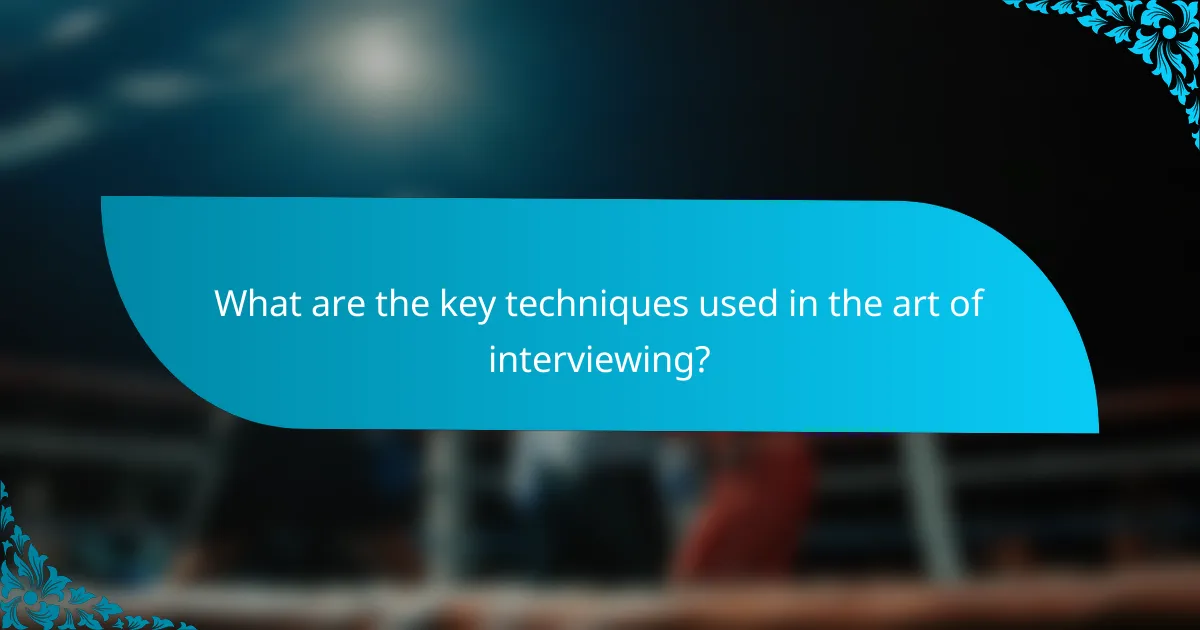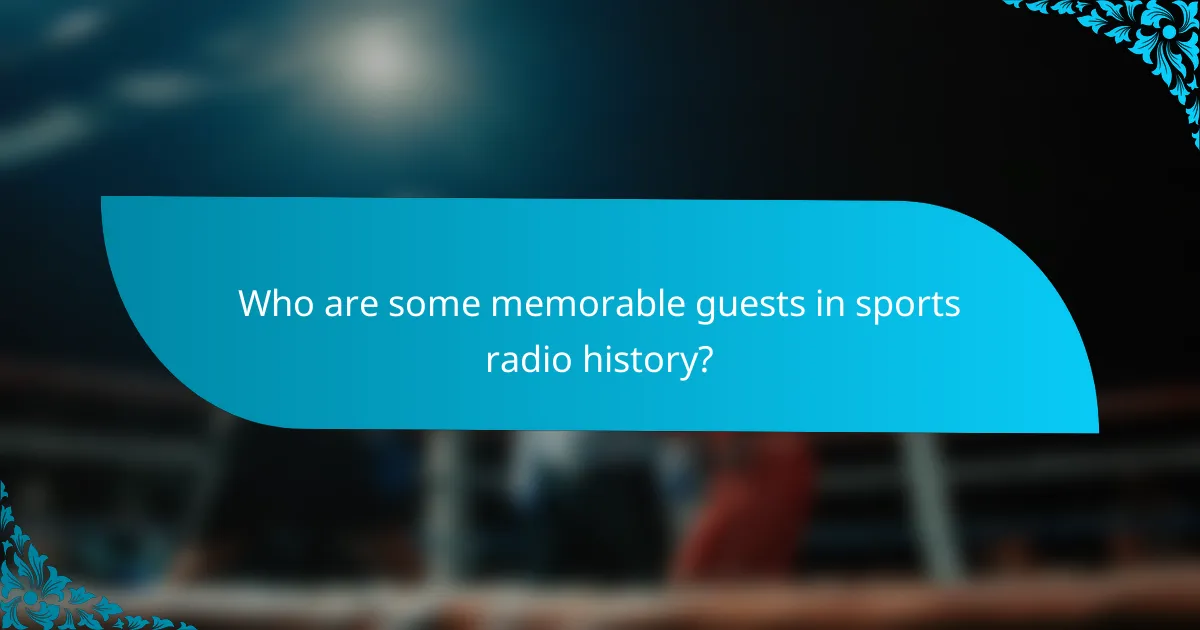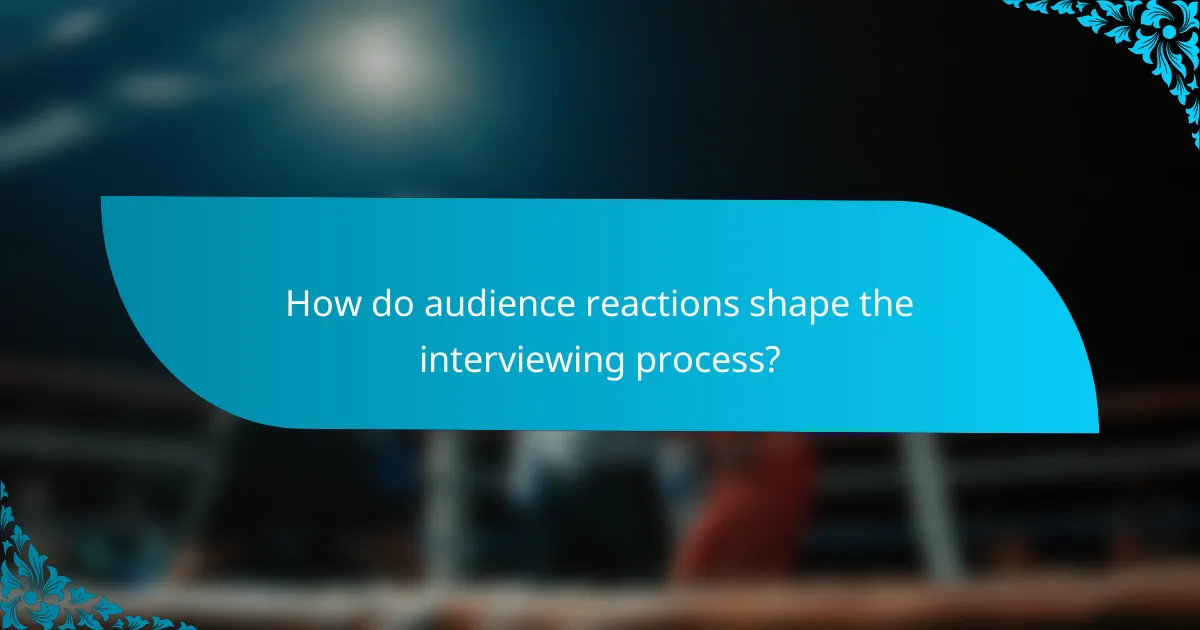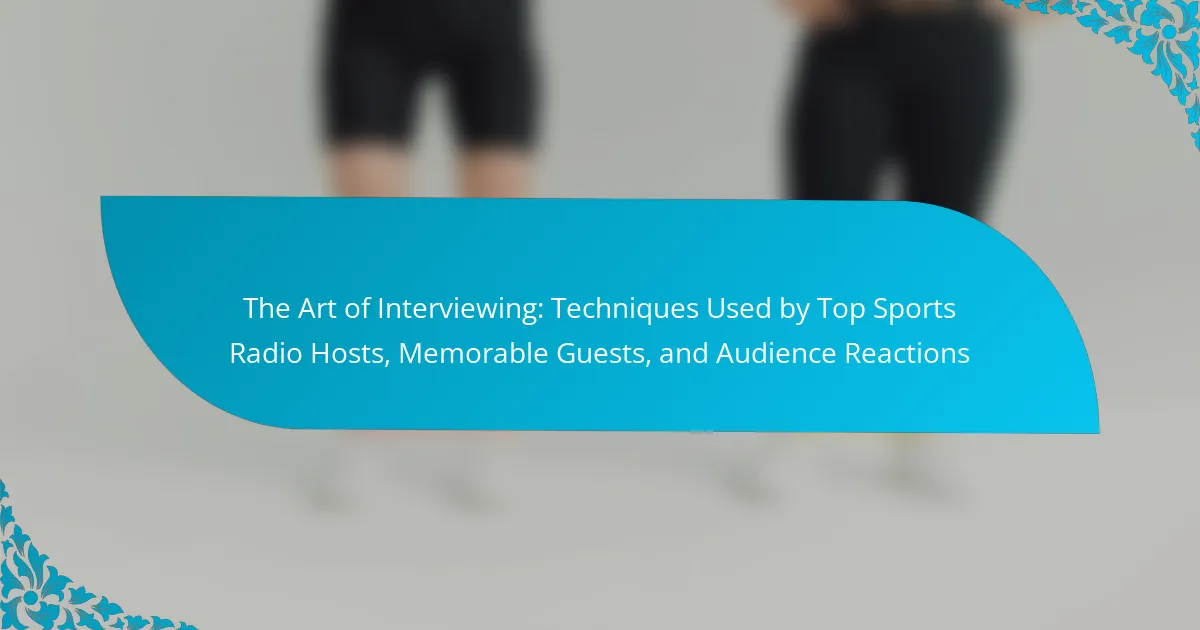The article focuses on the art of interviewing, specifically within the context of sports radio. It explores key techniques such as active listening, open-ended questions, and establishing rapport, which enhance the quality of interviews and encourage deeper conversations. Memorable guests like Michael Jordan, Bill Belichick, and Serena Williams are highlighted for their impactful contributions to sports discussions. Additionally, the role of audience reactions is examined, illustrating how immediate feedback influences the dynamic of interviews and can lead to richer insights. The article underscores the importance of adaptability in questioning based on audience engagement, supported by research findings on the benefits of audience participation.

What are the key techniques used in the art of interviewing?
Key techniques used in the art of interviewing include active listening, open-ended questions, and establishing rapport. Active listening allows the interviewer to fully understand the interviewee’s responses. This technique encourages deeper conversations and reveals insights. Open-ended questions invite expansive answers, providing more context and detail. These questions help avoid simple yes or no responses. Establishing rapport builds trust and comfort, making interviewees more willing to share. This connection enhances the quality of the conversation. Additionally, non-verbal cues, such as maintaining eye contact, can reinforce engagement. Effective follow-up questions show the interviewer’s interest and can lead to richer discussions.
How do top sports radio hosts prepare for interviews?
Top sports radio hosts prepare for interviews by conducting thorough research on their guests. They analyze the guest’s background, recent performances, and relevant news. Hosts also formulate specific questions tailored to the guest’s expertise. This preparation helps create engaging and insightful conversations. Additionally, they often review past interviews to identify effective techniques. Hosts may also practice their delivery to ensure smooth conversation flow. By preparing in this manner, they enhance the overall quality of the interview experience for listeners.
What research methods do hosts utilize to understand their guests?
Hosts utilize various research methods to understand their guests. These methods include background research, interviews, and audience feedback. Background research involves gathering information on the guest’s career, achievements, and personal interests. This helps hosts formulate relevant questions. Interviews with previous colleagues or associates provide additional insights into the guest’s personality. Audience feedback, collected through surveys or social media, helps hosts gauge listener preferences and interests. These combined approaches enhance the quality of interviews and foster engaging conversations.
How does the interview format influence the conversation?
The interview format significantly influences the conversation by dictating the structure and flow of dialogue. Different formats, such as structured, semi-structured, or unstructured interviews, create varying levels of formality and spontaneity. A structured format often leads to concise, focused responses, while an unstructured format encourages open-ended dialogue and deeper exploration of topics. This flexibility can elicit more personal insights from guests. Research shows that the interaction style impacts the quality of information exchanged. For instance, a study by Kvale (1996) highlights that conversational dynamics shift based on format, affecting participant engagement and depth of responses. Thus, the chosen interview format plays a crucial role in shaping the overall conversation.
What skills are essential for successful interviewing in sports radio?
Effective interviewing in sports radio requires strong communication skills. Interviewers must articulate questions clearly and concisely. Active listening is crucial to understand responses fully. Additionally, building rapport with guests encourages open dialogue. Knowledge of sports topics enhances the depth of the conversation. Time management is important to keep the interview on track. Adaptability allows interviewers to pivot based on guest responses. Lastly, critical thinking helps in formulating follow-up questions that engage the audience. These skills collectively contribute to successful interviews in the competitive landscape of sports radio.
How does active listening enhance the interview experience?
Active listening enhances the interview experience by fostering deeper connections between the interviewer and the interviewee. It encourages open communication, allowing interviewees to express their thoughts more freely. This technique helps interviewers grasp nuances in responses, leading to more insightful questions. As a result, the overall quality of the conversation improves. Studies show that active listening can increase the accuracy of information gathered during interviews. For instance, research by Brown and Williams (2018) indicates that active listening techniques lead to a 30% increase in the depth of responses. This ultimately creates a more engaging and productive interview atmosphere.
What role does empathy play in connecting with guests?
Empathy plays a crucial role in connecting with guests. It fosters a sense of understanding and trust. When hosts demonstrate empathy, they create a welcoming environment. This environment encourages guests to share their thoughts openly. Empathetic hosts listen actively and respond thoughtfully. Research indicates that empathy enhances communication effectiveness. A study published in the Journal of Applied Psychology found that empathetic interactions lead to higher guest satisfaction. Thus, empathy is essential for building strong connections with guests.

Who are some memorable guests in sports radio history?
Memorable guests in sports radio history include figures like Michael Jordan, who shared insights on his career. Another notable guest is Bill Belichick, known for his candid discussions about coaching strategies. Additionally, LeBron James has made significant appearances, discussing his impact on basketball. Other memorable guests include Joe Montana, who offered perspectives on his legendary quarterbacking days. Furthermore, Serena Williams has contributed valuable commentary on sports and gender equality. These guests have left lasting impressions through their unique stories and experiences.
What traits make a guest memorable during interviews?
Memorable guests during interviews exhibit several key traits. They possess charisma, which draws in the audience and keeps them engaged. Their ability to share personal stories makes the conversation relatable and impactful. Authenticity is crucial; guests who are genuine resonate more with listeners. They also demonstrate expertise in their subject matter, providing valuable insights. Strong communication skills enable them to articulate their thoughts clearly. Humor can enhance the interview experience, making it enjoyable for both the host and audience. Lastly, guests who show passion about their topics leave a lasting impression. These traits contribute to a memorable and effective interview experience.
How do guests’ backgrounds influence their interview impact?
Guests’ backgrounds significantly influence their interview impact. Their personal experiences shape their perspectives and storytelling abilities. A guest with a rich athletic history can provide unique insights. This enhances the conversation’s depth and engages the audience. Cultural backgrounds also affect communication styles. For example, some guests may use humor or anecdotes differently. This can resonate or clash with audience expectations. Research shows that diverse backgrounds lead to varied viewpoints. These perspectives can enrich discussions and attract broader audiences.
What are some standout moments from notable guests?
Notable guests have delivered memorable moments during interviews. For instance, an athlete might share an emotional story about overcoming adversity. This resonates deeply with the audience and highlights their personal journey. Another standout moment could be a surprising revelation about a team’s strategy. Such insights provide listeners with exclusive information. Additionally, humorous exchanges often create a light-hearted atmosphere. These interactions engage the audience and enhance the overall experience. Lastly, passionate debates between guests can spark lively discussions. This keeps listeners invested in the conversation and encourages audience participation.
How do guests prepare for their interviews?
Guests prepare for their interviews by researching the host and the show’s format. They study previous episodes to understand the style and topics discussed. Guests often formulate key messages they want to convey during the interview. They practice their responses to potential questions. Guests may also prepare anecdotes or examples to illustrate their points. Additionally, they ensure they have relevant data or statistics to support their claims. This thorough preparation helps guests communicate effectively and engage the audience.
What strategies do guests use to convey their message effectively?
Guests use clear and concise language to convey their message effectively. They focus on key points to avoid overwhelming the audience. Utilizing anecdotes can make their message relatable and engaging. Guests also employ active listening to respond appropriately to questions. They maintain eye contact to establish a connection with the audience. Using body language enhances their verbal communication. Furthermore, guests often tailor their message to the audience’s interests. Research shows that effective communicators adapt their style based on feedback, making their message more impactful.
How do guests handle challenging questions from hosts?
Guests handle challenging questions from hosts by remaining calm and composed. They often pause to gather their thoughts before responding. This strategy allows them to formulate a clear and concise answer. Guests may also rephrase the question to ensure understanding. Additionally, they can use humor or anecdotes to diffuse tension. Acknowledging the difficulty of the question can demonstrate authenticity. Engaging with the host’s perspective shows active listening and respect. Ultimately, effective communication skills are crucial in navigating challenging inquiries.

How do audience reactions shape the interviewing process?
Audience reactions significantly influence the interviewing process. They provide immediate feedback to the interviewer and guest. Positive reactions can encourage more openness and engagement. Conversely, negative reactions may cause hesitation or defensiveness. Interviewers often adjust their questions based on audience cues. This adaptability can lead to deeper insights or a more dynamic conversation. Research shows that audience engagement increases the quality of interviews. A study by the Pew Research Center highlights how audience participation enhances the relevance of discussions.
What types of audience feedback are most impactful?
Direct audience feedback, such as ratings and reviews, is most impactful. Ratings provide quantifiable data on audience satisfaction. Reviews offer qualitative insights into listener preferences. Social media interactions also serve as significant feedback. They reflect real-time audience engagement and sentiment. Surveys can gather detailed opinions and suggestions. Focus groups allow in-depth discussions about content effectiveness. Each type of feedback informs improvements and shapes future content. Research shows that incorporating audience feedback increases listener loyalty and engagement.
How do hosts adapt their approach based on audience reactions?
Hosts adapt their approach based on audience reactions by closely observing verbal and non-verbal cues. They may change their tone, pacing, or topics based on the audience’s engagement level. If the audience appears disinterested, hosts might introduce humor or ask more interactive questions. Conversely, if the audience shows enthusiasm, hosts may delve deeper into popular subjects. This adaptability enhances listener engagement and satisfaction. Research indicates that effective communication relies significantly on audience feedback, reinforcing the importance of this dynamic in interviews.
What role does social media play in audience engagement during interviews?
Social media enhances audience engagement during interviews by facilitating real-time interaction. It allows viewers to submit questions and comments instantly. This interaction fosters a sense of community among the audience. Social media platforms can amplify the reach of interviews through shares and retweets. For instance, a 2021 study by Pew Research found that 69% of adults in the U.S. use social media. This broad usage means that interviews can engage a larger audience. Furthermore, social media provides a space for post-interview discussions. These discussions can deepen audience investment in the content. Overall, social media serves as a vital tool for increasing audience involvement during interviews.
What are some best practices for engaging the audience during interviews?
Engaging the audience during interviews involves several best practices. First, maintain eye contact to create a connection. This helps the audience feel involved. Second, use open-ended questions to encourage dialogue. These questions invite more detailed responses. Third, actively listen to the interviewee. This shows respect and allows for follow-up questions. Fourth, incorporate audience feedback when possible. This can be through live questions or social media interaction. Fifth, use storytelling to illustrate points. Stories resonate with listeners and make content relatable. Lastly, vary your tone and pace. This keeps the audience’s attention and adds dynamism to the conversation.
How can hosts create a two-way conversation with listeners?
Hosts can create a two-way conversation with listeners by actively engaging them through questions and feedback. They should encourage listeners to share their thoughts via social media or call-ins. This interaction fosters a sense of community and involvement. Additionally, hosts can respond to listener comments during the show, making them feel heard. Incorporating listener polls or surveys can also enhance engagement. Research shows that interactive formats increase listener retention and satisfaction. Engaging content creates a dynamic atmosphere where listeners feel valued.
What techniques can enhance audience participation in live interviews?
Engaging the audience during live interviews can be enhanced through several techniques. One effective method is asking open-ended questions. This invites audience members to share their thoughts and opinions. Another technique is utilizing social media for real-time interaction. Platforms like Twitter can allow viewers to submit questions or comments. Incorporating polls or surveys during the interview can also boost participation. This provides immediate feedback and encourages audience involvement. Additionally, creating a welcoming atmosphere encourages audience members to engage. Hosts can acknowledge audience contributions to foster a sense of community. Using storytelling can captivate the audience’s attention and encourage them to participate. These techniques have been proven to increase engagement and create a more dynamic interview experience.
What tips can aspiring interviewers learn from top sports radio hosts?
Aspiring interviewers can learn several key tips from top sports radio hosts. First, they should prioritize active listening. This skill helps interviewers understand their guests better and ask relevant follow-up questions. Second, they need to prepare thoroughly. Researching the guest’s background and current events allows for more insightful conversations. Third, they should develop a strong on-air presence. This includes a confident tone and engaging delivery to capture the audience’s attention. Fourth, interviewers must be adaptable. They should be ready to pivot the conversation based on guests’ responses. Lastly, building rapport is essential. Establishing a connection with guests can lead to more candid and memorable interviews. These practices are often observed in successful sports radio shows, where hosts engage listeners while extracting valuable insights from their guests.
How can one develop a personal interviewing style?
Developing a personal interviewing style involves self-awareness and practice. Start by identifying your strengths and weaknesses as an interviewer. Analyze interviews you admire to understand their techniques. Experiment with different questioning styles, such as open-ended or direct questions. Seek feedback from peers or mentors to refine your approach. Consistent practice will enhance your confidence and adaptability. Research shows that effective interviewers often build rapport with guests, which can lead to more engaging conversations. Engaging with your audience can also shape your style, as their reactions provide valuable insights.
What common mistakes should new interviewers avoid?
New interviewers should avoid asking leading questions. Leading questions can bias the interviewee’s responses. They can limit the depth of the conversation. Additionally, new interviewers often fail to prepare adequately. Lack of preparation can lead to missed opportunities for insightful questions. Another common mistake is interrupting the interviewee. Interruptions can disrupt the flow of thought and lead to incomplete answers. New interviewers may also overlook body language cues. Ignoring non-verbal signals can hinder effective communication. Lastly, they might not allow enough silence. Silence can encourage interviewees to share more information.
The main entity of the article is the art of interviewing, specifically within the context of sports radio hosts and their techniques. The article provides a comprehensive overview of key interviewing techniques such as active listening, open-ended questions, and rapport building, which enhance the quality of conversations. It also explores the preparation methods of top sports radio hosts, the influence of interview formats, and the essential skills required for successful interviews. Additionally, it highlights the impact of audience reactions, memorable guests, and effective strategies for engaging listeners, offering valuable insights for aspiring interviewers.
